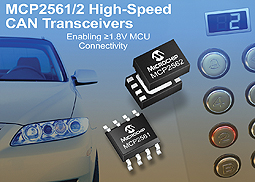
Microchip announces a new family of High-Speed (HS) CAN transceivers, the MCP2561/2. These new devices serve as an interface between a CAN protocol controller and the physical two-wire CAN bus. The new family of transceivers meet CAN specification requirement “GIFT ICT Group Conformance Test Specification V1.0” as verified by C&S Group GmbH in addition to other global automotive Electromagnetic Compatibility (EMC) requirements such as “Hardware Requirements for LIN, CAN and FlexRay Interfaces in Automotive Applications,” Version 1.3, May 2012 as verified by IBEE. Customers can have confidence in CAN conformance and high robustness increasing ease of development and system reliability.
The new family of MCP2561/2 transceivers provides two device options. The MCP2561 is a HS CAN transceiver in an 8-pin package and features a SPLIT pin. The SPLIT pin helps to stabilize common mode in biased split termination schemes. The MCP2562 is also an HS CAN transceiver available in an 8-pin package and features a Vio pin. The Vio pin can be tied to a secondary supply in order to internally level shift the CAN transceiver digital I/Os for easy microcontroller interfacing. This is beneficial when a system is using a microcontroller at a Vdd less than 5V (for example, 1.8V or 3.3V).
The transceivers have an industry low standby current consumption ( < 5µA typical) helping to meet automotive Electronic Control Unit (ECU) low power budget requirements. Both parts are also available in 8-lead PDIP, SOIC and 3×3 mm DFN (leadless) package types allowing for development flexibility and offering alternatives for space-limited application boards. Additionally, the devices support both Extended (E): −40°C to +125°C and High (H): −40°C to +150°C temperature ranges providing customers the ability to use one part across various CAN connected applications. The MCP2561/2 CAN transceivers are well suited for a wide range of applications in the automotive market including power train, body and convenience, diagnostics, safety and security; and in the industrial market, including manufacturing, construction and agriculture, among others.
MICROCHIP TECHNOLOGY
www.microchip.com/get/2REU


